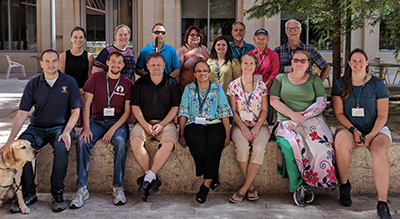AccessCSforAll Professional Development Workshop for Teachers of Blind and Visually Impaired Students

AccessCSforAll held its first professional development workshop for teachers of blind and visually impaired students at the University of Texas, Austin, for one week in early July 2018. The workshop was led by AccessCSforAll principal investigators Richard Ladner and Andreas Stefik. Assisting were William Allee, Quorum programming language developer, and Sean Mealin, PhD student at North Carolina State University and AccessComputing Team member. Eleven teachers from ten different states and Puerto Rico participated in the workshop that focused on the accessible Computer Science Principles (CSP), which is based on the Code.org CSP curriculum and the Quorum Language lessons. Activities in the workshop were modeled after the activities at Code.org’s TeacherCon professional development workshop held in Atlanta in June 2018 that Ladner attended. Activities at the AccessCSforAll workshop included an overview of CSP, lesson preparation and teaching by participants, Quorum programming language overview and lessons, and critiques of the latest accessible CSP curriculum draft developed by the AccessCSforAll team at the University of Nevada, Las Vegas. The critique included suggestions to make the curriculum, both plugged and unplugged activities, more accessible for blind and visually impaired students. Three of the teachers, who came from mainstream schools, did not have experience with blind students, but were expecting them in their classes this coming year. One session included advice by the experienced teachers of blind students on proper etiquette when interacting with blind people. There will be additional professional development, done remotely, with these teachers during the academic year. In 2019, AccessCSforAll will hold additional professional development workshops for teachers of deaf students and teachers of learning disabled students.